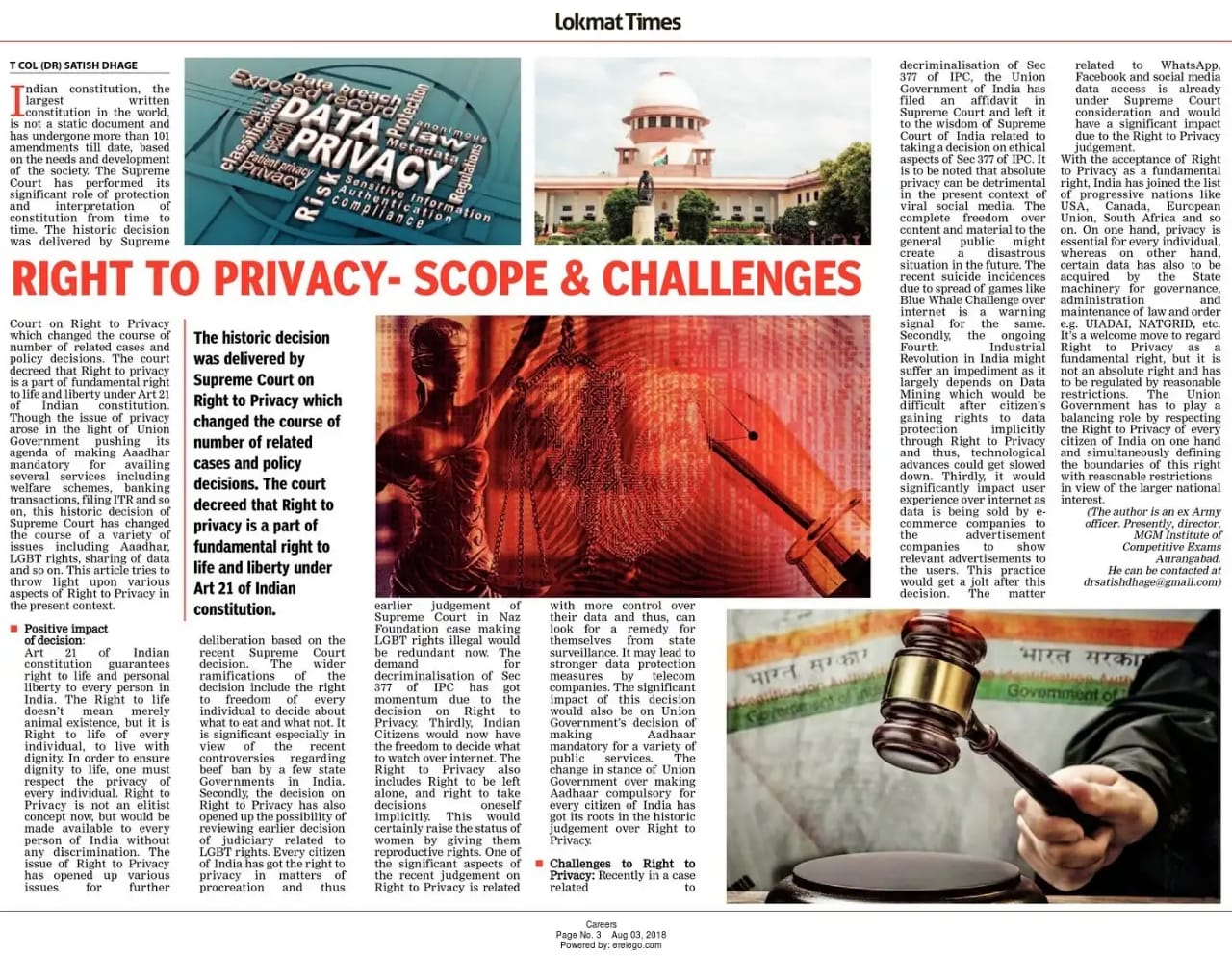Right to privacy scole & challenges
Indian constitution, the largest written constitution in the world, is not a static document and has undergone more than 101 amendments till date, based on the needs and development of the society. The Supreme Court has performed its significant role of protection and interpretation of constitution from time to time. The historic decision was delivered by Supreme Court on Right to Privacy which changed the course of number of related cases and policy decisions. The court decreed that Right to privacy is a part of fundamental right to life and liberty under Art 21 of Indian constitution. Though the issue of privacy arose in the light of Union Government pushing its agenda of making Aaadhar mandatory for availing several services including welfare schemes, banking transactions, filing ITR and so on, this historic decision of Supreme Court has changed the course of a variety of issues including Aaadhar, LGBT rights, sharing of data and so on. This article tries to throw light upon various aspects of Right to Privacy in the present context. Positive impact of decision- Art 21 of Indian constitution guarantees right to life and personal liberty to every person in India. The Right to life doesn’t mean merely animal existence, but it is Right to life of every individual, to live with dignity. In order to ensure dignity to life, one must respect the privacy of every individual. Right to Privacy is not an elitist concept now, but would be made available to every person of India without any discrimination. The issue of Right to Privacy has opened up various issues for further deliberation based on the recent Supreme Court decision. The wider ramifications of the decision include the right to freedom of every individual to decide about what to eat and what not. It is significant especially in view of the recent controversies regarding beef ban by a few state Governments in India. Secondly, the decision on Right to Privacy has also opened up the possibility of reviewing earlier decision of judiciary related to LGBT rights. Every citizen of India has got the right to privacy in matters of procreation and thus earlier judgement of Supreme Court in Naz Foundation case making LGBT rights illegal would be redundant now. The demand for decriminalisation of Sec 377 of IPC has got momentum due to the decision on Right to Privacy. Thirdly, Indian Citizens would now have the freedom to decide what to watch over internet. The Right to Privacy also includes Right to be left alone, and right to take decisions oneself implicitly. This would certainly raise the status of women by giving them reproductive rights. One of the significant aspects of the recent judgement on Right to Privacy is related with more control over their data and thus, can look for a remedy for themselves from state surveillance. It may lead to stronger data protection measures by telecom companies. The significant impact of this decision would also be on Union Government’s decision of making Aadhaar mandatory for a variety of public services. The change in stance of Union Government over making Aadhaar compulsory for every citizen of India has got its roots in the historic judgement over Right to Privacy. Challenges to Right to Privacy – Recently in a case related to decriminalisation of Sec 377 of IPC, the Union Government of India has filed an affidavit in Supreme Court and left it to the wisdom of Supreme Court of India related to taking a decision on ethical aspects of Sec 377 of IPC. It is to be noted that absolute privacy can be detrimental in the present context of viral social media. The complete freedom over content and material to the general public might create a disastrous situation in the future. The recent suicide incidences due to spread of games like Blue Whale Challenge over internet is a warning signal for the same. Secondly, the ongoing Fourth Industrial Revolution in India might suffer an impediment as it largely depends on Data Mining which would be difficult after citizen’s gaining rights to data protection implicitly through Right to Privacy and thus, technological advances could get slowed down. Thirdly, it would significantly impact user experience over internet as data is being sold by e-commerce companies to the advertisement companies to show relevant advertisements to the users. This practice would get a jolt after this decision. The matter related to Whatsapp, Facebook and social media data access is already under Supreme Court consideration and would have a significant impact due to the Right to Privacy judgement. With the acceptance of Right to Privacy as a fundamental right, India has joined the list of progressive nations like USA, Canada, European Union, South Africa and so on. On one hand, privacy is essential for every individual, whereas on other hand, certain data has also to be acquired by the State machinery for governance, administration and maintenance of law and order e.g. UIADAI, NATGRID, etc. It’s a welcome move to regard Right to Privacy as a fundamental right, but it is not an absolute right and has to be regulated by reasonable restrictions. The Union Government has to play a balancing role by respecting the Right to Privacy of every citizen of India on one hand and simultaneously defining the boundaries of this right with reasonable restrictions in view of the larger national interest. (The author of this article ,Lt Col (Dr) Satish Dhage, is an ex Army officer and has been qualified for IPS (Indian Police Services) through IPS LCE 2012. Presently, he is Director, MGM Institute of Competitive Exams Aurangabad. For any queries or feedback, he can be contacted on email id : drsatishdhage@gmail.com)



